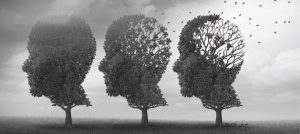By Richard J. Capiola, MD


Normal Memory Changes with Aging
It’s normal to experience some memory changes as we grow older. These changes are often characterized by:
. Slower Processing Speed: As we age, the speed at which we process information may decline, leading to mild forgetfulness.
. Difficulty with Multitasking: Juggling multiple tasks becomes more challenging, which can affect our ability to remember things.
. Recall Issues: Temporary forgetfulness about names, words, or where you left your keys may occur.
. Absent-Mindedness: Occasionally forgetting appointments or details due to distractions is common.
Dementia and Alzheimer’s Disease
Dementia is not a normal part of aging. It is a group of cognitive disorders that significantly impair daily functioning. Alzheimer’s disease is the most common cause of dementia. Warning signs include:
. Severe Memory Loss: Profound memory deficits, particularly for recent events or familiar people.
. Confusion: Difficulty with orientation, time, and place.
. Personality Changes: Noticeable shifts in mood, behavior, and personality.
. Decline in Problem-Solving Skills: Struggles with managing finances, making decisions, or solving problems.
Depression-Related Memory Issues
Depression in the elderly can mimic dementia symptoms, creating a diagnostic challenge. Common signs include:
. Memory Complaints: Feeling forgetful, though memory tests may not show significant impairment.
. Concentration Problems: Difficulty focusing and making decisions.
. Apathy: Loss of interest in activities and social withdrawal.
. Sleep Disturbances: Insomnia or excessive sleeping.
Differentiating Between the Three
Differentiating between normal aging, dementia, and depression-related memory issues can be challenging. Consult a healthcare professional for an accurate diagnosis. Medical assessments, cognitive tests, and brain imaging can help distinguish the causes.
Managing Memory Changes
To clarify and address memory changes, regardless of their origin, consider the following:
. Lifestyle Modifications: Maintain a healthy diet, stay physically active, and engage in mental stimulation through activities like puzzles or learning new skills.
. Social Interaction: Staying socially connected can improve cognitive health and prevent depression.
. Seek Help: If memory issues persist, consult a healthcare provider to rule out underlying conditions.
In conclusion, understanding memory changes in aging and distinguishing them from dementia, Alzheimer’s disease, or depression-related issues is crucial. Recognizing the signs and seeking professional guidance can make all the difference in ensuring the best possible cognitive health and quality of life as we age.
Dr. Richard J. Capiola is the Chief of Psychiatry for Physicians Regional Medical Center. He received his medical degree from Tulane University School of Medicine and has been in practice for more than 20 years. Call Dr. Capiola today at 239-649-7494.
 Southwest Florida's Health and Wellness Magazine Health and Wellness Articles
Southwest Florida's Health and Wellness Magazine Health and Wellness Articles
